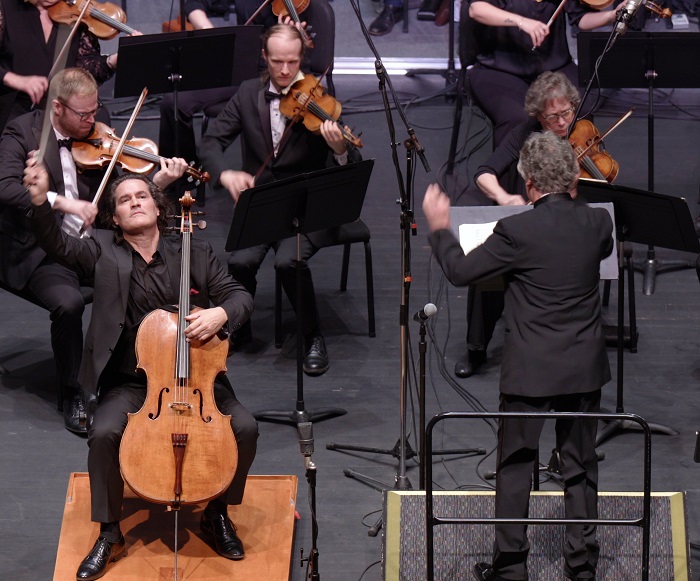Zuill Bailey comes home for up-and-down Dvořák with Fairfax Symphony

Cellist Zuill Bailey performed with conductor Christopher Zimmerman and the Fairfax Symphony Orchestra Saturday night at GMU Center for the Arts. Photos: Blue House Productions
The Fairfax Symphony Orchestra’s concert on Saturday closed out its 65th season, and it felt like a family reunion at times. A greater-than-usual number of children packed the Center for the Arts at George Mason University, part of the FSO’s outreach efforts with Fairfax County Public Schools.
Before the concert, the crowd was invited to cheer for Emile “Mickey” Zimmerman, the FSO’s first concertmaster, now 95; after intermission, music director Christopher Zimmerman announced the retirements of two longtime section principals, percussionist Shari Clark Rak and violist Gregory Rupert.
Cellist Zuill Bailey won the FSO’s 1987 Feuer String Competition at the tender age of 14. Now an internationally known virtuoso, the Woodbridge native returned to play Antonín Dvořák’s Cello Concerto.
Like many homecomings, the Dvořák began awkwardly. Zimmerman took an overly measured pace in the first movement, not giving the lift that the music needed; understandably, when Bailey came in, he wanted to play faster. Orchestra and cellist spent much of the first movement resolving this tension, with many little eddies of confusion along the way.
In the slower music of the second movement, though, Zimmerman and Bailey had no trouble getting on the same wavelength. Bailey’s cello lines shimmered with attractive colors and sustained intensity while the FSO provided gracious support. The rondo finale felt a little tentative at times, but again Bailey and the FSO shone in the slower portions, with the final section a golden-hued meditation from Bailey before the exuberant coda.
After Bailey returned to the stage for an encore, he said, “It’s so thrilling to see so many young people here,” and reminisced on his own youthful concert attendance. Bailey even went so far as to say, “I love the baby screaming!” This was a reference to an infrequent but distinct addition to the aural texture in the Dvořák. His encore of Brahms’ Lullaby went down to a nearly inaudible whisper of tone at the end, after which Bailey put his finger to his lips.
FSO assistant conductor John Murton led Jessie Montgomery’s 2014 work Banner to open the program. Written for string orchestra with a solo string quartet, Banner examines the American national anthem through a modern lens. Harmonic dissections and refractions of its drinking-song theme mix with allusions to other songs that say something about America. The music moved fast, both in tempo and in its shifting ideas; churning cells often drove the rhythm, while at one point, footstomps imitated a marching-band drumline, leading to a martial flurry of notes. Murton helped steer the quick shifts of mood, closing with a breakdown into chaos followed by a major chord that did not feel wholly triumphant.
The challenge posed by Carl Nielsen’s Fourth Symphony (“The Inextinguishable”), which closed the program, is how to make all its energy and force, and the striking moments they often produce, into something larger. The composer himself wrote that the symphony “is in a way a completely thoughtless expression of what make the birds cry, the animals roar, bleat, run and fight, and humans moan, groan, exult, and shout without any explanation.”
Zimmerman carefully drew out the quotes and echoes of themes within the symphony to emphasize its musical narrative, bringing some order to what can feel chaotic. More important, Zimmerman and the FSO made everything vivid. The winds deftly sketched their second-movement melody, the strings bristled with agitation and issued stern proclamations in the third movement, and the battle between the timpani sets played by Jonathan Milke and Jeff Grant in the finale had a titanic impact. This performance brought to mind other words of Nielsen’s about this symphony: “Once more: music is life, and like it inextinguishable.”
The Fairfax Symphony Orchestra’s 2023-24 season opens with Renée Fleming singing Richard Strauss’ Four Last Songs November 16. fairfaxsymphony.org

